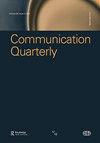“Do You Really Want to be Disappointed?”: Adoptees’ Expectations and Violations During Birth Family Contact
IF 1
Q2 COMMUNICATION
引用次数: 0
Abstract
ABSTRACT The current study used an Expectancy Violations Theory (EVT) framework to explore the expectations that adult adoptees have as they begin to make contact with birth family members. Thirty-two semi-structured interviews with adoptees revealed expectations for birth family contact, violations that occurred during contact, and effects of those violations. Largely, expectations were negative, as adoptees were concerned that contact would (a) cause problems for the birth family member, (b) result in a second rejection, or (c) reveal negative information about the birth family member. Adoptees experienced both positive and negative violations when they made contact, resulting in feelings of uncertainty. These results shed light on the complicated process of making birth family contact.“你真的想失望吗?”:被收养者在出生与家庭接触中的期望和违规行为
摘要本研究采用期望违背理论(EVT)框架来探讨成年被收养人在开始与出生家庭成员接触时的期望。对被收养者的32次半结构化访谈揭示了对出生家庭接触的期望、接触期间发生的侵犯行为以及这些侵犯行为的影响。在很大程度上,期望是负面的,因为被收养者担心接触会(a)给出生家庭成员带来问题,(b)导致第二次拒绝,或(c)透露出生家庭成员的负面信息。被收养者在接触时既经历了积极的侵犯,也经历了消极的侵犯,从而产生了不确定感。这些结果揭示了出生与家庭接触的复杂过程。
本文章由计算机程序翻译,如有差异,请以英文原文为准。
求助全文
约1分钟内获得全文
求助全文

 求助内容:
求助内容: 应助结果提醒方式:
应助结果提醒方式:


